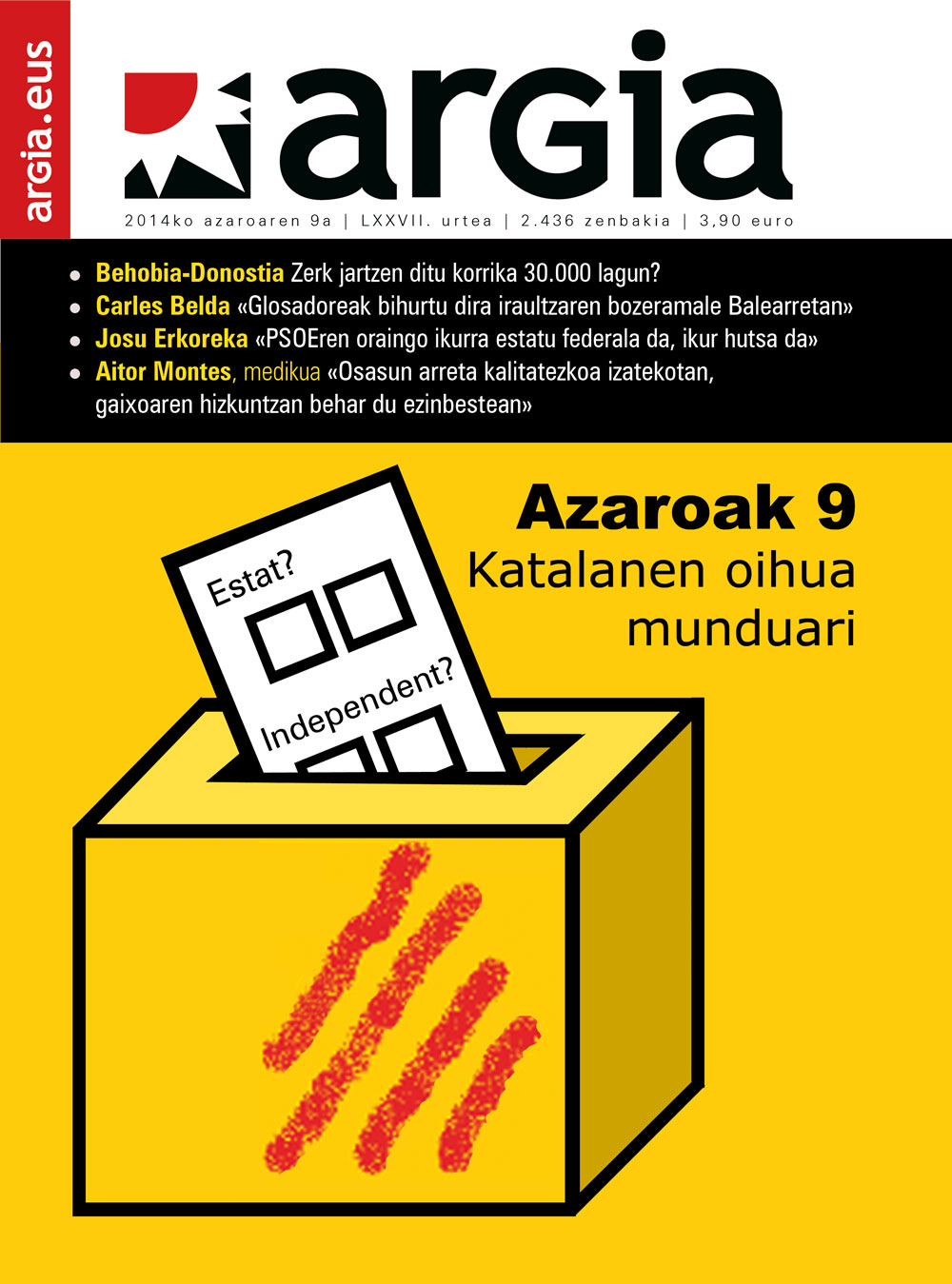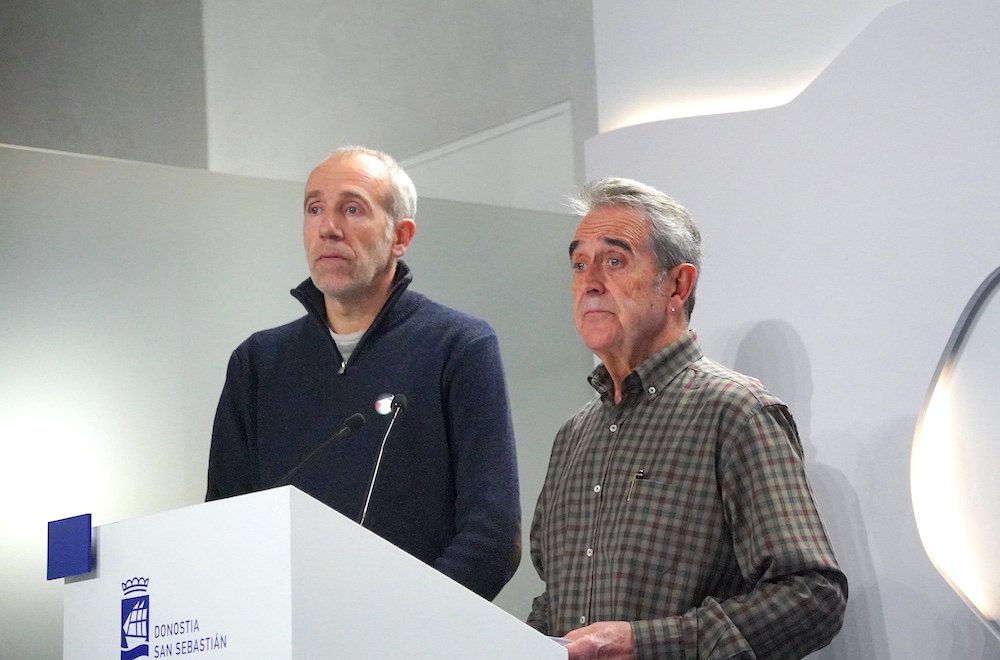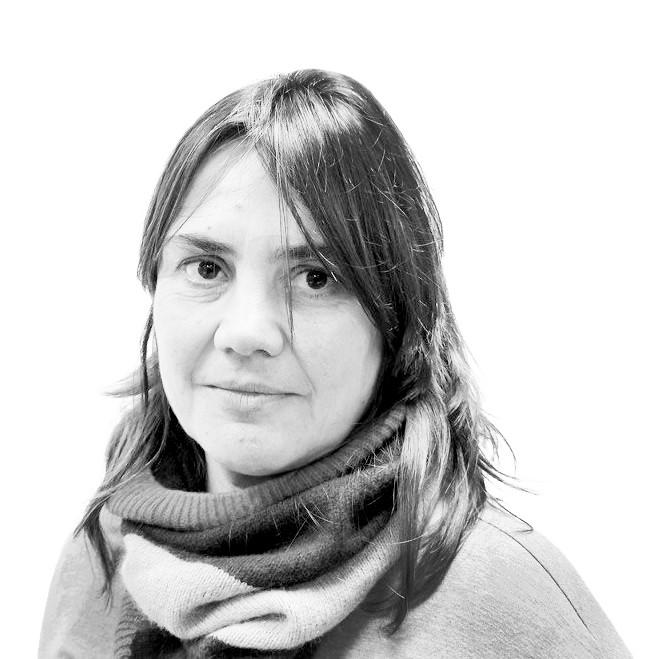"Just as important as what we mean is how we want to get it."
- Bermeo 1960. He is a member of the PNV. The Minister of Public Administration and Justice of the Basque Country and Spokesperson of the Basque Government. He has told us that it is dangerous to question the independence of the Spanish justice system. In his opinion, there is everything among the judges. For example, the measures taken by magistrates Pablo Ruz or Eloy Velasco, who do not like the 'popular'.

We have started an interview with Josu Erkoreka, spokesman for the Basque Government, on the article Patience, hope and determination drafted by lehendakari Iñigo Urkullu.
In his article, lehendakari highlighted the words "patience and hope" of lehendakari. They are the virtues of people, but what is worth in democracy, and especially for personal freedom, is determination. Has politics not become a matter of faith?
Commitment must be placed in life and politics in hope and faith. Although we do not know what will happen in the future, the compromise is linked to what we want to see happen in the future. Commitment must give the person the faith in the steps he has to take and the goals he wants to achieve. If we reject that faith beforehand, if we do not believe that those steps will be taken, the objectives are broken.
Lehendakari, Iñigo Urkullu, has said that ETA announced its end three years ago and that "we are better". But political experts are skeptical, and society is, in part, desperate.
In any case, it is objectively undeniable that the current situation is better than the present one, which is particularly evident in society in general. The risk of terrorist attacks does not exist, the fear has spread for many years and the measures to be taken have disappeared. Society is quieter and more focused coexistence. Of course, in all societies there are dialectics and contradictions, problems will never disappear or disappear.
But how can such decision-making power – the right to decide – be realised by lehendakari when it is prevented by law. How to overcome the current status quo after 35 years of policy according to the laws of the state...
But these are purely political problems, there is no framework within which a political project has no obstacles to achieving its objectives. These are difficulties characteristic of politics. Each State and each country has its areas, but so far ...
I wanted to add if the essence of the problem is in an uncertain transition.
I would not dare to do one thing with another. We are not going to discover that there is now a political problem because ETA has neglected its armed activity. In Catalonia they have not had the problem of terrorism, but there they have also encountered the same difficulties in carrying out their national work. In any democratic context, the political project itself has always found obstacles, it is a normal political scenario. Difficulties and conditions are characteristic of policy. What is not acceptable in politics, however, is that other obstacles should be imposed in addition to their own, such as the violation of human rights committed by ETA. If someone thought that after years of ETA’s activity, the political difficulties would disappear, then...
On determination, the Scots have held a referendum in which they have decided their sovereignty. What conclusions did you draw from the process?
Well, when some people tell us over and over again that “stateless nations have no right to decide”, in Scotland we have seen clearly that, in addition to being, it has been implemented. Where and in the heart of Europe, in Britain. Therefore, the arguments that have been put forward in the Spanish State to deny it have no support. That of Scotland has been the strongest and most clear argument for opposing consultation, and that is that it may be done in Europe.
The consultation will take place in Catalonia on 9 November. Is the path of the Catalans useful for the Basques?
First of all, I do not see any significant differences between the Catalan process and the one we put here eight years ago. We are talking about the Catalan model, but the process, from a conceptual point of view, has no difference with the one promoted by lehendakari Ibarretxe. The legal and doctrinal foundations are similar. For this reason, and given that the process is similar, the obstacles he has encountered in Madrid are similar. The TC wall and the arguments are the same, since they have not been changed in any way since then. Of course, apart from that, the Catalan social movement is strong, which was not here.
You do not see a positive exit to the so-called consultation.
It's not a consultation, it's a participatory process. They have named it that way, and that is reflected in their regulations. That has no official status, it is more, it has wanted to take as many touches as possible so that it is not transferred to the courts.
What value do you give to the initiative?
At the moment, rather than an institutional initiative, I believe it is a political and, perhaps, electoral initiative. Some of the steps behind the initiative have more to do with elections than with an institutional and social initiative. It is very difficult for the institutions to break the law and act outside the law. Lehendakari Ibarretxe, faced with legality, decided not to take any step outside the law. The main Catalan institutions have also decided the same thing after many tensions and swings.
What is the new status that the PNV intends to propose today? Does the Ibarretxe Plan serve that?
What does the PNV propose? One thing is that each one has its doctrinal bases and another thing that can be proposed at every moment to make a viable policy. The situation has not changed for the last eight years, so what was raised then is repeated now, with the same content ... The evolution of this proposal in Catalonia with the same conceptual content, therefore, when dealing with such a strategy, the Plan will have to be evaluated. In order to take this step, the Basque Government is waiting for Parliament to be adopted. The first steps towards self-government must be taken in Parliament.
EH Bildu should be the natural partner of the PNV, but while lehendakari Urkullu says that “with confidence and loyalty to Spain you can take a step forward in self-government”, Hasier Arraiz of EH Bildu says that “shared sovereignty and bilaterality with Spain is impossible”. Is there a possibility for both sides to open the way?
More important than at the moment the objective and the dream of each party is to see how to act, we saw it here and we have seen it also in Catalonia. To say that bilaterality is not possible with the Government of Madrid can be fine as a constancy. The question is: Is it possible to exercise the right to decide now? I have not seen any concrete proposal from the left hand of the Abertzale. I refer to the drafting: How? We hear what the objectives of EH Bildu are, I can also say them. As important as saying what we want here and now is saying how we want to achieve it. For those of us who live in the Spanish State, for whom we are Basque, here and in Catalonia, those who have a concrete and clear content of the question ask us how to do it.
“How?” He asks that he may not be able to answer.
I have not heard any qualitative contribution from anyone. It is perhaps the debate in the parliamentary report that leads to the answer. We must pay attention to our past and to what is going to happen in Catalonia. To see how to do one in diligence by agreeing on goals.
The new general secretary of the PSE-EE, Idoia Mendia, has proposed a reform of the Spanish Constitution.
Again, how? When they also ask the PSE, they do not formally say what steps should be taken to achieve this. A constitutional reform? OK. Constitution 1. If in the article it says that “the right of self-determination of the Basque Country and Catalonia is recognized”, it is done. But that is not going to be achieved since today, nor will it be in the medium term for the Courts to do this. Pp is absolutely against, UPyD and others. Nor do I see the PSOE in that position. The current symbol of the PSOE is the federal state, an empty symbol. It is nothing more than a word, behind there is no sound proposal. I have read what has been done about this. I have not seen the contributions that the New Federal State can make to the autonomous communities, I have not read that they question their Spanish or a reflection on their Spanish. So ...
The political framework, as well as the law, which was embodied in the Transition, is established forever above the will of the peoples. And I'm just CAPV.
The abertzales of Catalonia and from here we will always claim our sovereignty and criticize the unitary centralist structure of the State. We are obliged to act against the pre-political dogma that the Spanish State has established around its unity. In art, the world and the political arena are changing, we cannot give up, we cannot despair, but knowing that these changes are not achieved overnight. In parliamentary debates I often hear: “First we have to act on self-government, to own all our economic resources, and then to deal more effectively with the economic crisis.” As if it were possible to achieve an independent Basque from one day to the next. In other words, until we achieve the political status that we want, and using the economic resources that this gives us, as if it were possible to move on to the second area, which is the most efficient. It is one thing to defend a political approach and it is another thing to think that from one day to the next you can put everything else at your mercy.
The Abertzale left accuses the PNV of ambiguity.
I see in them an ambiguity, even more, a silence when I ask how. I am not ambiguous in my purposes. The aim of every Abertzale is to have maximum sovereignty. We want for us the sovereignty shared by the European states. But how? I ask them and they keep quiet. Ambiguous me or PNV? It is not our business alone, neither here nor in Catalonia. It's about "how?"
Item 1 of the Government’s Hitzeman initiative states: The disarmament and disappearance of ETA. How can that be done if the Spanish Government, which has an important part in peace and coexistence, does not want to intervene?
It is true that the Spanish Government has not taken a step forward in the last three years. The Basque Government, for its part, wants to press ahead with the means at its disposal to avoid duplication. That is where the Hitzeman initiative stands. The central government itself is going to see what it is going to do about it. In a different situation, to continue with the same policies that so far is an obvious mistake for us. To the extent that the situation has changed, the Government of Spain should adapt the policy to the new situation. We have already said so for a long time, but it does not want to change political judgement.
EH Bildu calls the Hitzeman into question. As long as State Justice uses special criminal legislation against the "enemy" that has been created by the conflict, it is pointless.
We have competence in prison policy, but not the transfer of it, not least because the State is unwilling to do so. However, it is one thing to be able to conduct prison policy and another is to help the prisoner who wants to reintegrate into society. If a prisoner wants to use the ordinary benefits of prison law to make his life more bearable, use them. That cannot deny the Government competence. In other words, despite the fact that prison policy is not in our hands, specific projects can be implemented in different areas: socio-occupational training programmes, agreed with those in charge of prison institutions. And not only do we need another attitude from the state, but we also need total freedom between prisoners to take whatever action they want, with total freedom. But we often see that, even though the situation has changed, the attitude of some prisoners and sectors has not changed.
According to the head of the Hitzeman initiative, Jonan Fernández, we can offer Hitzeman, but we cannot compromise that the penitentiary policy will be changed.
Of course, because not all the resources are in our hands, but because they are not, are we not going to do anything? Until we achieve everything, will we not make any efforts? This is the situation that Hitzeman responds to. We, faced with those who want to maintain a firm attitude and an attitude of exception – non-human attitudes – want to contribute to the maximum humanization of the socio-political situation, all of us have to help.
“The Abertzale left has to redefine the ethical floor, it has to take steps…” you said. The State should also be asked for its ethical ground. There are, among other things, the processes of torture.
These are the words that I spoke in relation to the words that Hasier Arraiz used in the general policy debate, and that must be understood in that context. He himself said that they were prepared to take steps to make the work of the peace and coexistence conference viable. We will therefore follow carefully the steps they have announced. Apart from that, I do not think anyone would question that when there has been torture they are wrong. When abuses, police abuses have been committed, when they have not been properly tried in the courts, I have seen no one defending them. When we talk about ethical soil, we are doing so to say that it renounces the violence that has been used in the past, as a political resource and that it has never been good at achieving political goals. We do not get the same answer from all parties on this. That is where the differences between the two must be located. It is undeniable that torture is wrong.
What attitude does pp adopt in condemning torture, for example?
I've never heard anyone from the PP here saying he supports torture.
EUR 904 billion. This is the annual cost of corruption in the European Union, according to a study carried out in 2020. Between 2008 and 2020, 3,743 cases of corruption were published in the media, of which 109 corresponded to Hego Euskal Herria. Of course, we will find more... [+]

























